Completed evaluations
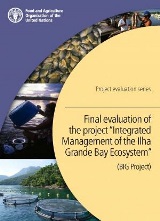
Final evaluation of the project “Integrated Management of the Ilha Grande Bay Ecosystem” (BIG Project)
29/05/2019
To preserve and make sustainable use of the Ilha Grande Bay (BIG) ecosystem and its terrestrial and marine biodiversity, the project aims to support the creation of an enabling environment, institutional arrangements and public support directed at two critical threats to the system: organic pollution from urban waste water and solid wastes associated with recreational marinas.
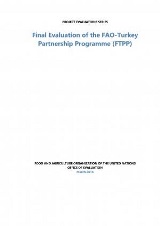
Evaluation of the FAO-Turkey Partnership Programme
20/05/2019
This evaluation assessed strategic positioning of the first phase of the FAO-Turkey programme, its results and contributions, sustainability, as well as coherence and catalytic effects.
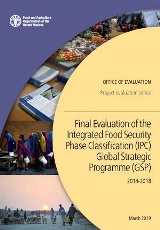
Final Evaluation of the Integrated Food Security Phase Classification (IPC) Global Strategic Programme (GSP) - 2014-2018
11/04/2019
The Integrated Food Security Phase Classification (IPC) is a set of standard protocols for the analysis of the food security situation in a country’s regions, based on available data (surveys, statistics, studies). The final evaluation of the IPC Global Strategic Programme (GSP, 2014-2018) focused mainly on the utilization and utility of the IPC (who is using it and for what?) and its institutionalization (ownership and sustainability of the IPC).
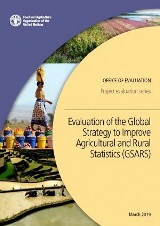
Evaluation of the Global Strategy to Improve Agricultural and Rural Statistics (GSARS)
05/04/2019
Global Strategy is the largest-ever effort to improve agricultural and rural statistics in developing countries. The programme built the capacity of agricultural and rural statistics in Africa and Asia-Pacific through research, training and technical assistance. It exceeded the intended outputs of its research component; the training component benefitted many training...
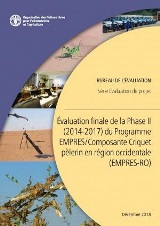
Final evaluation of Phase II (2014-2017) of EMPRES Programme/Controlling the Desert Locust in the Western Region (EMPRES-RO)
29/03/2019
The independent evaluation of the second phase of EMPRES-RO programme was requested in 2017 by the member countries of the FAO Commission for Controlling the Desert Locust in the Western Region (CLCPRO, Commission FAO de lutte contre le Criquet pèlerin dans la Région occidentale). It concluded that the Programme contributed to the sustainability of locust management in the region.
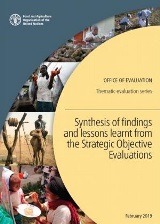
Synthesis of findings and lessons learnt from the Strategic Objective Evaluations
07/03/2019
Building on the thematic evaluations undertaken by OED in the period 2014-17, this synthesis draws findings and lessons regarding the conceptualization, operationalization and results of the reviewed Strategic Framework.
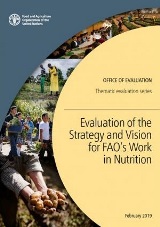
Evaluation of the Strategy and Vision for FAO’s Work in Nutrition
07/03/2019
This evaluation appraises progress achieved on the implementation of the Strategy and Vision for FAO’s Work on Nutrition since it was adopted in 2012. FAO’s nutrition-sensitive work has grown significantly since the Strategy was promulgated, and has evolved towards more deliberate efforts to address all forms of malnutrition.
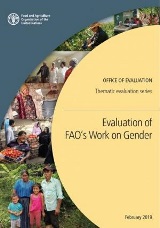
Evaluation of FAO’s work on gender
07/03/2019
The evaluation examined the implementation of FAO Policy on Gender Equality from 2012 - 2017. It concluded that the policy remains relevant to FAO’s overall mandate and strategic goals. FAO has invested in mechanisms to institutionalize gender mainstreaming, produced a number of technical guidelines and awareness-raising material, forged partnerships to bring in gender dimension in project implementation, and made significant strides towards achieving gender-equality results.
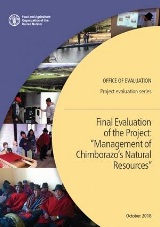
Final Evaluation of the Project: "Management of Chimborazo’s Natural Resources"
22/02/2019
The GEF-funded project “Management of Chimborazo’s Natural Resources" aimed to conserve and sustainably manage the “páramo” ecosystem. The ecosystem offers important environmental services, such as the production of water, capture of CO2 and great variety of native crops preserved with the traditional knowledge of indigenous communities.
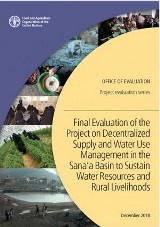
Final Evaluation of the Project on Decentralized Supply and Water Use Management in the Sana’a Basin to Sustain Water Resources and Rural Livelihoods
07/02/2019
The “Decentralised Supply and Water Use Management in the Sana’a Basin” project was designed to promote sustainable water resources management. The evaluation found the project to be highly relevant to the country’s needs and effective in contributing towards improved livelihoods resilience.
